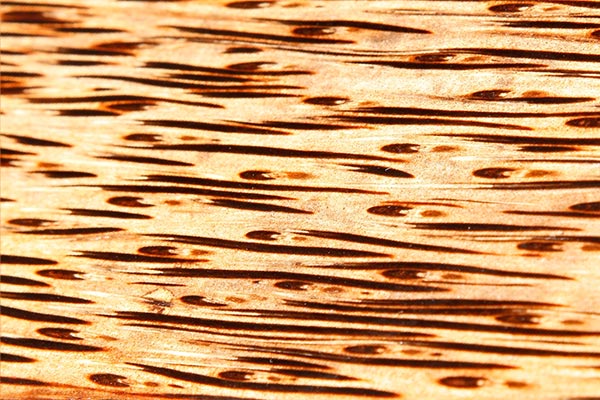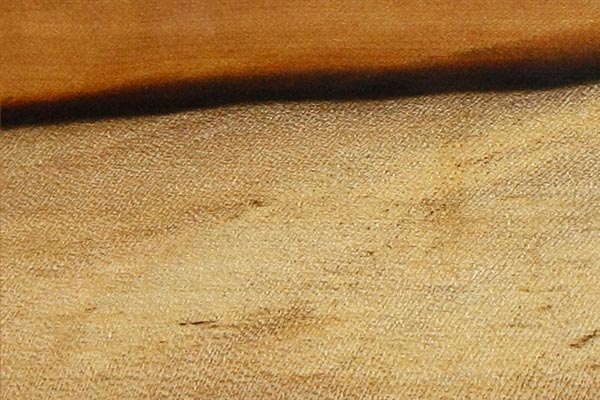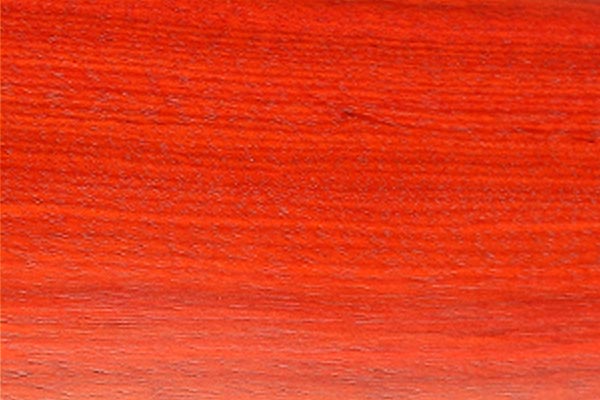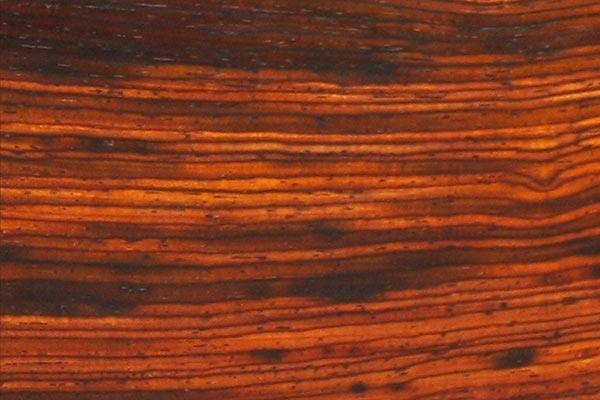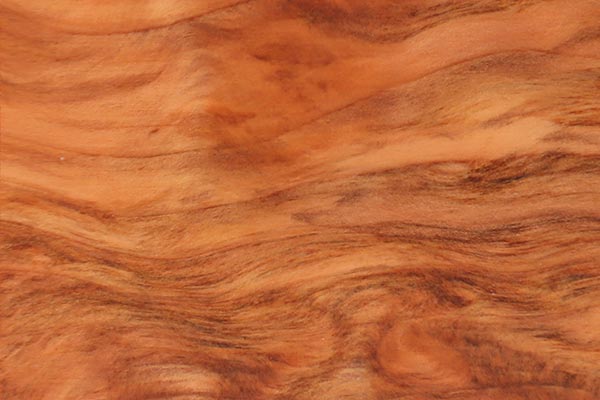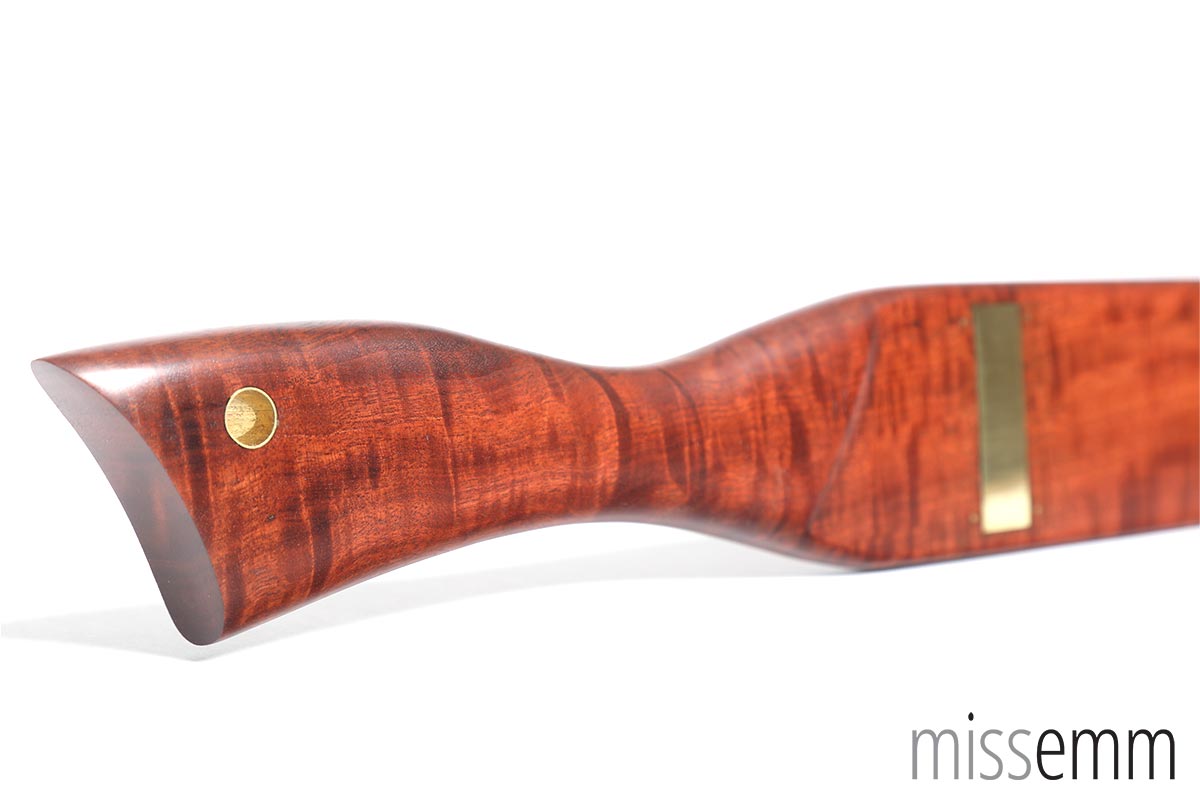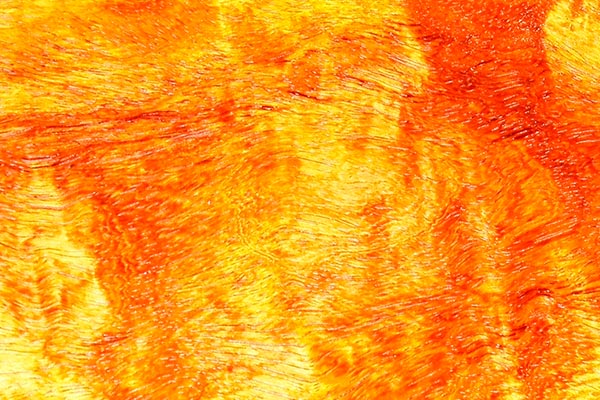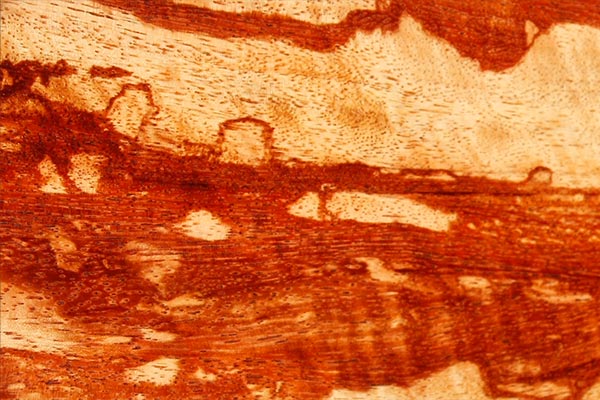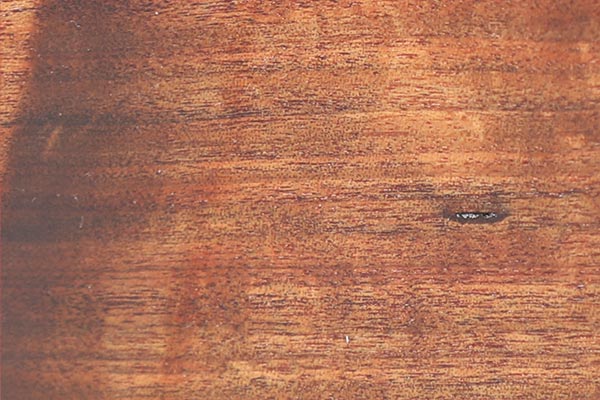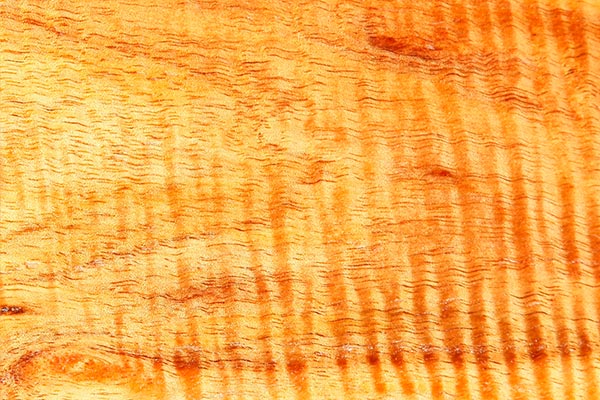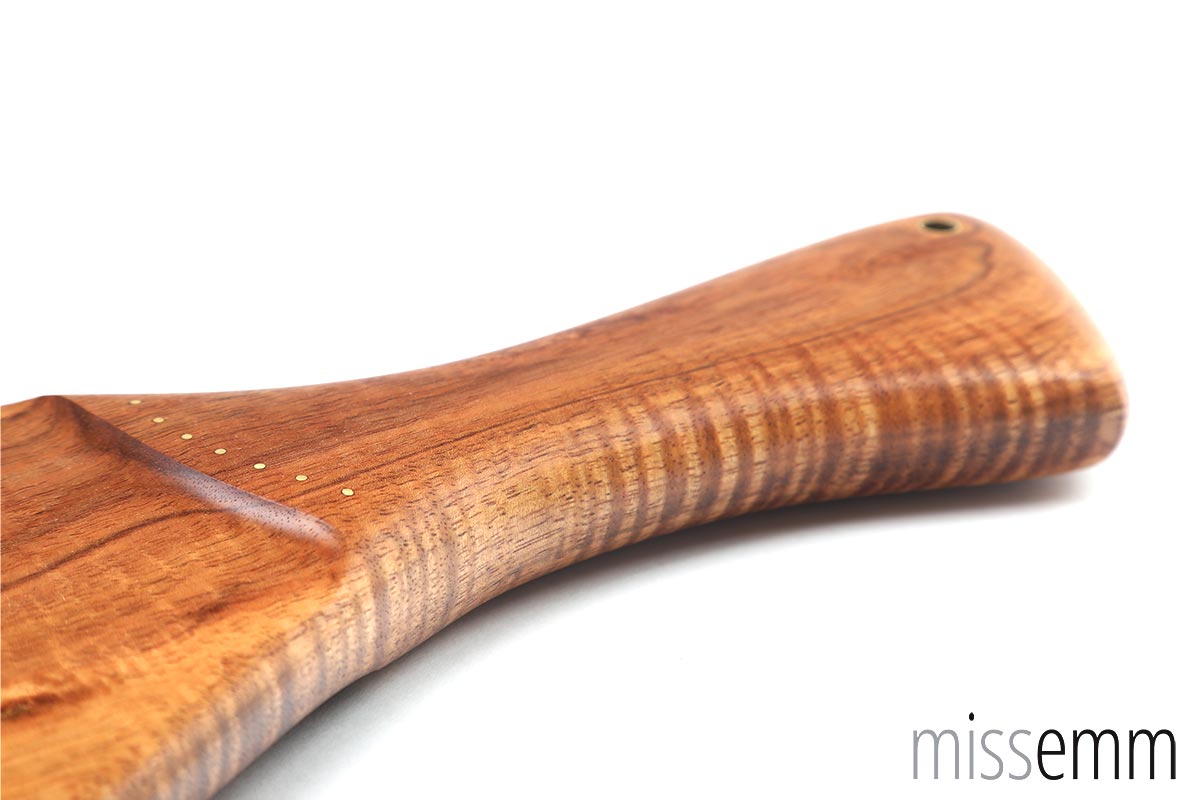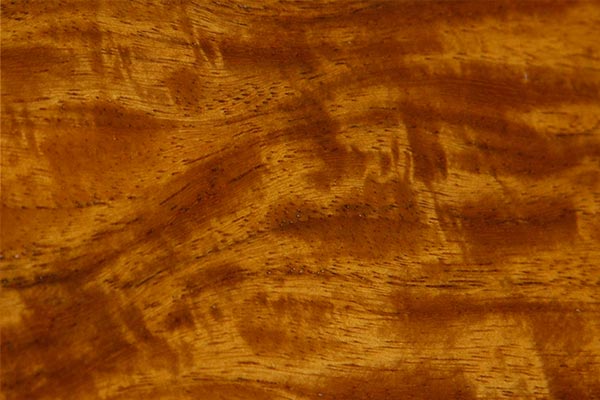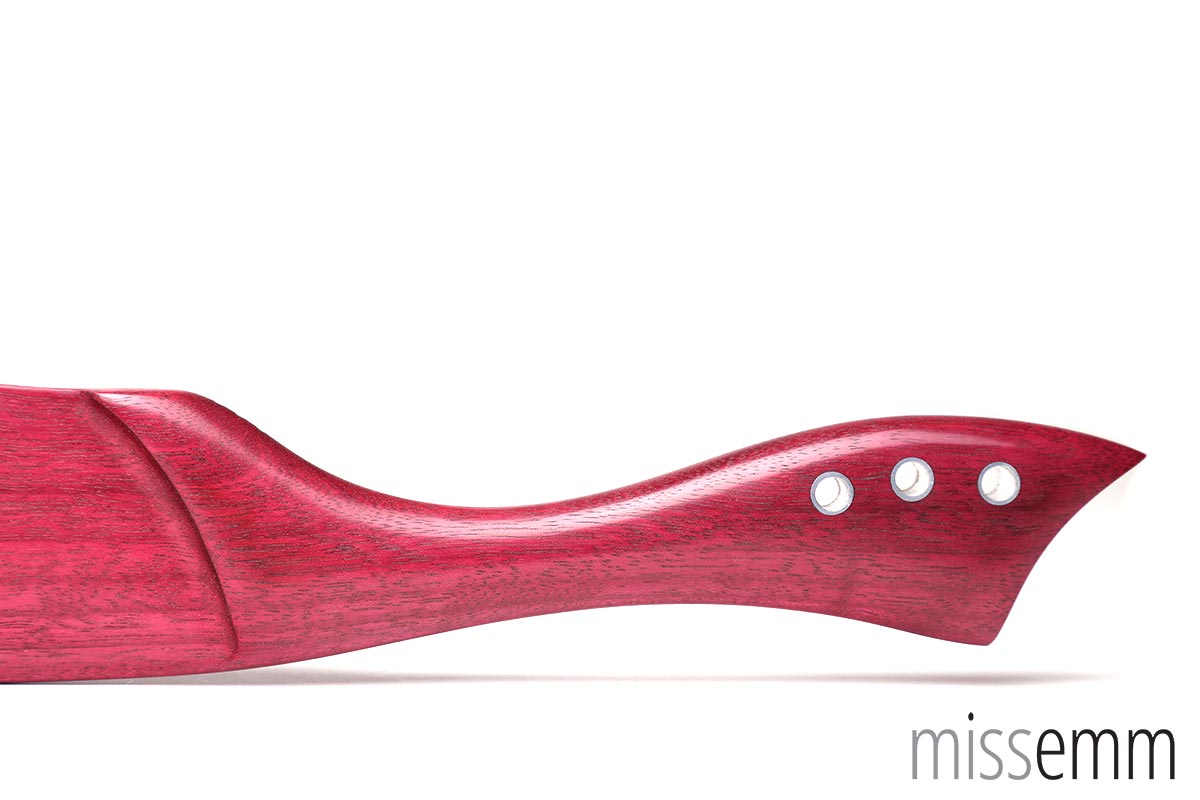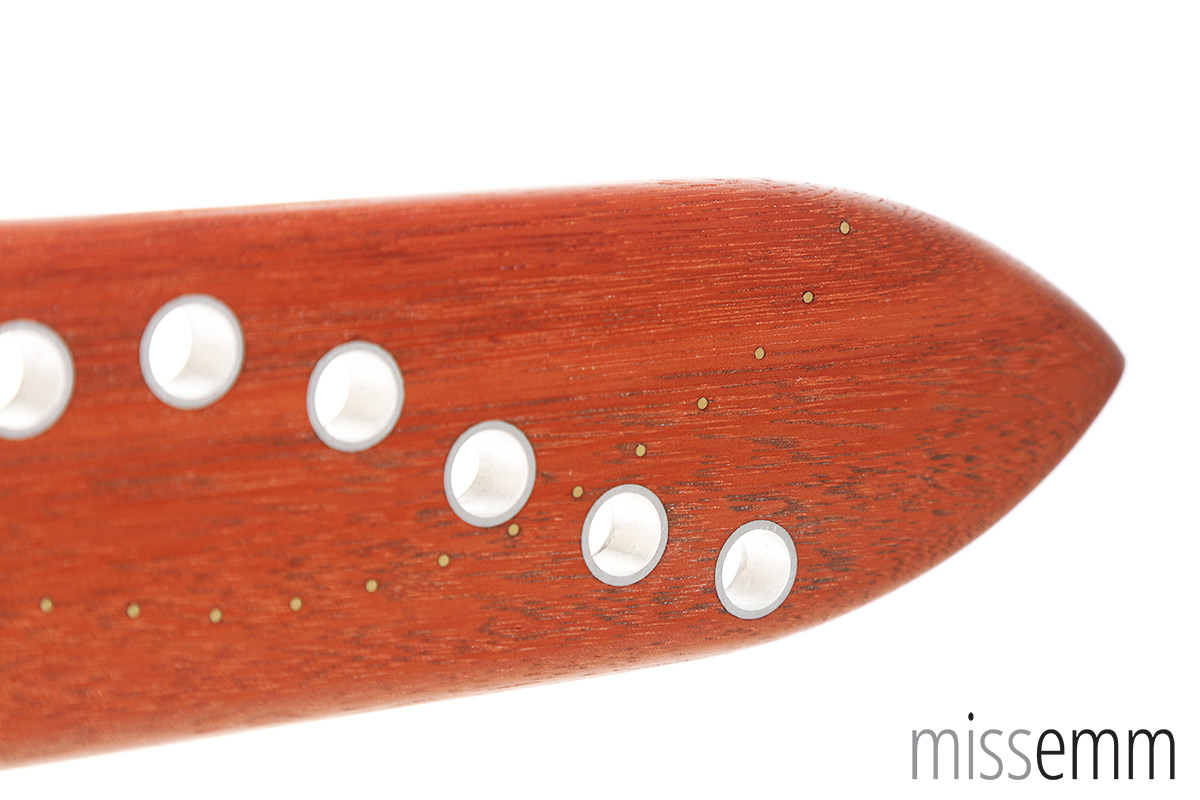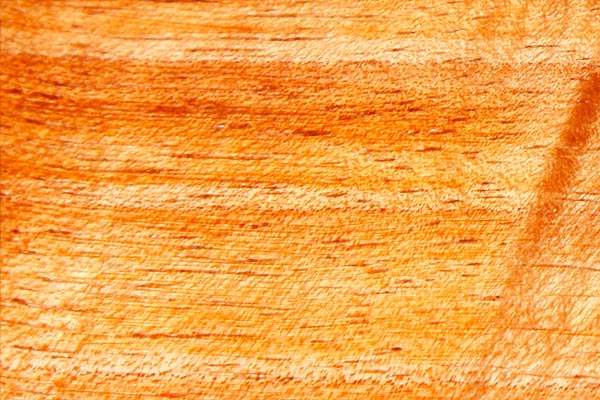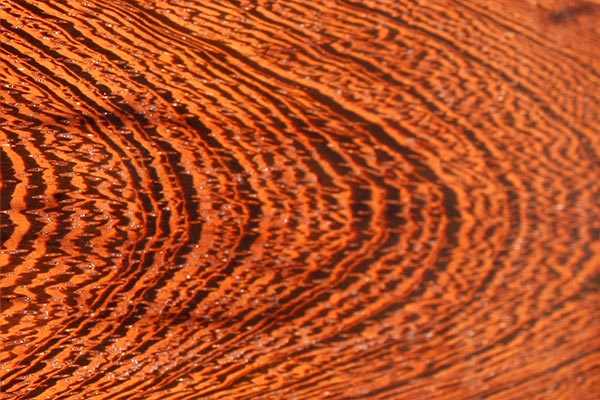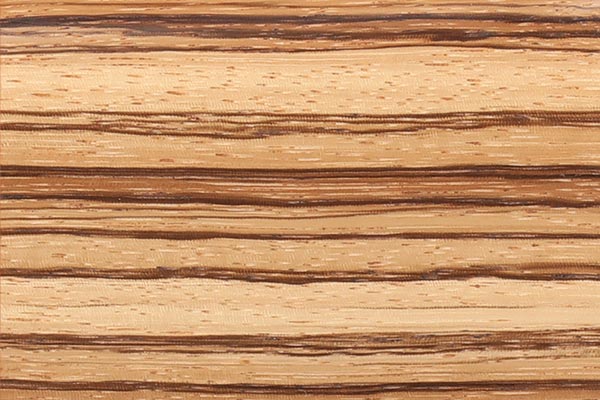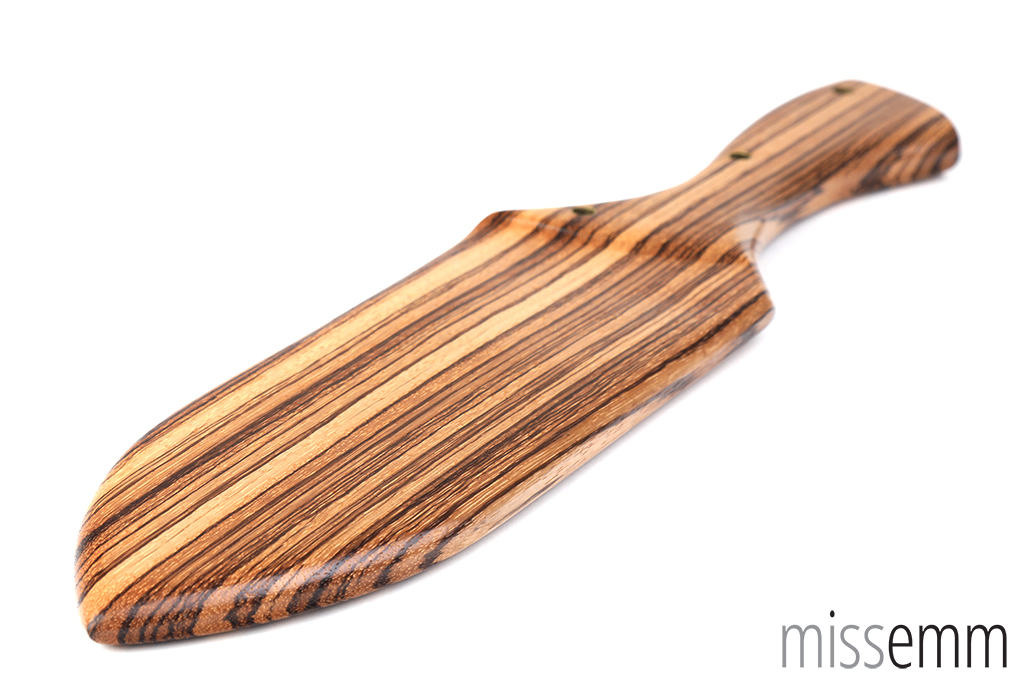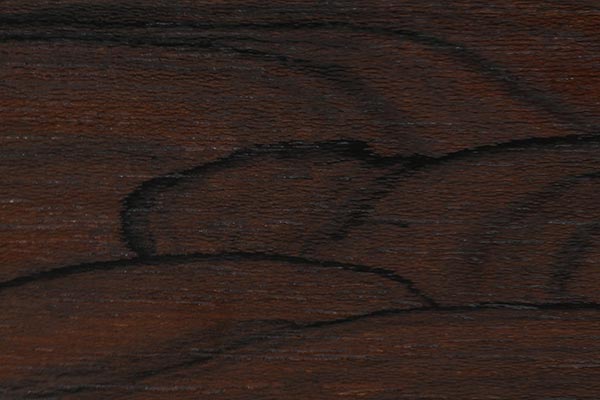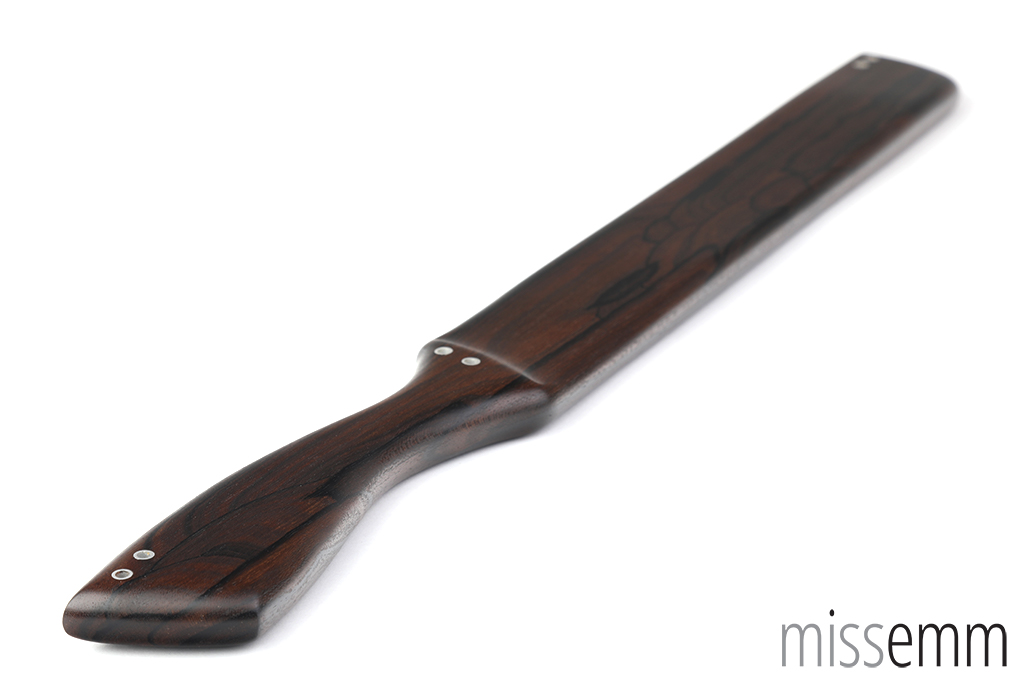My wood collection
I started collecting wood in 2009, and so far have amassed over fifty different species in pieces large enough for a paddle. Most of the Australian timbers are acquired from local timber merchants or one of the timber and woodworking shows held around Australia each year. I have acquired exotic timbers both here in Australia and on my travels overseas, particularly in Japan.
Each wood species below includes its density, which is how much it weighs compared to water. Wood with a density greater than 1 will sink. Lignum Vitae (density 1.26) is the heaviest wood I have used for paddle making. It is 3.5x heavier than the lightest wood I've used, which is Japanese Cedar (density 0.36).
All the images below are actual photographs of finished paddles made from timber in my collection.
African Padauk |
|
|
|
Scientific name: Pterocarpus soyauxii Other common names: Vermillion Distribution: Central and Tropical West Africa Density: 0.75 |
American Oak |
|
|
|
Scientific name: Querus alba Other common names: White Oak Distribution: Eastern United States Density: 0.75 |
American Black Walnut |
|
|
|
Scientific name: Juglans nigra Other common names: Black Walnut, Virginia Walnut Distribution: Eastern North America Density: 0.62 Notable uses: Cabinet and furniture making |
Australian Red Cedar |
|
|
|
Scientific name: Toona Ciliata Distribution: Australia and Southern Asia Density: 0.49 |
Australian Rosewood |
|
|
|
Scientific name: Dysoxylum fraseranum Other common name: Rose Mahogany Distribution: NSW/Qld East Coast Density: 0.71 |
Black Palm |
|
|
|
Scientific name: Borassus flabellifer Distribution: Tropical Asia, Africa Density: 0.97 Comments: Black palm is neither a hardwood nor a softwood. It is a monocotyledon. Palms have no growth rings. The wood is softer in the middle of the tree, which is the opposite of most hardwoods and softwoods. |
Blackheart Sassafras |
|
|
|
Scientific name: Atherosperma moschatum Distribution: Tasmania Density: 0.62 |
Bloodwood |
|
|
|
Scientific name: Brosmum rubescens Other common names: Satine Distribution: Tropical South America Density: 1.05 |
Brazilian Walnut |
|
|
|
Scientific name: Ocotea porosa Other common names: Imbuia Distribution: Southern Brazil Density: 0.66 Comments: Brazilian Walnut is not actually species of walnut, but the timber physically resembles true walnut. |
Brazilwood |
|
|
|
Scientific name: Paubrasilia echinata Distribution: Brazil Density: 0.98 Notable uses: Bows for violins and other stringed instruments. |
Budgeroo |
|
|
|
Scientific name: Lysicarpus angustifolious Distribution: Outback Queensland Density: 0.5 Comments: No longer available in commercial quantities. |
Buloke |
|
|
|
Scientific name: Allocasuarina luehmannii Distribution: Eastern Australia Density: 1.11 |
Burmese Teak |
|
|
|
Scientific name: Tectona grandis Distribution: Native to Southern Asia. Grown in plantations in Africa, Latin America and Asia. Density: 0.66 Notable uses: Boat building. Often used to make outdoor furniture due to its resistance to rot and decay. |
Camphor Laurel |
|
|
|
Scientific name: Cinnamomum camphora Distribution: Native to China. Introduced to and now widespread in Eastern Australia. Density: 0.52 Notable uses: Solid slab tables and chairs. Comments: Camphor laurel is classified as a noxious weed in parts of NSW under the NSW Noxious Weeds Act 1993! |
Cocobolo |
|
|
|
Scientific name: Dalbergia retusa Distribution: Central America Density: 1.1 |
Fijian Mahogany |
|
|
|
Scientific name: Swietenia macrophylla Distribution: Fiji Density: 0.55 Comments: Fijian mahogany is often referred to as plantation mahogany. It is the same species as mahogany found in Central and South America, and the seeds were originally sourced from Belize. |
Forest Red Gum |
|
|
|
Scientific name: Eucalyptus tereticornis, Eucalyptus blakelyi ssp Distribution: East coast of Australia. Southern Papau New Guinea Density: 1.01-1.06 |
Gidgee |
|
|
|
Scientific name: Acacia cambagei, Acacia pruinocarpa Distribution: Australia Density: 1.15 |
Grey Ironbark |
|
|
|
Scientific name: Eucalyptus paniculata, Eucalyptus siderophloia Distribution: Australia Density: 1.25 |
Huon Pine |
|
|
|
Scientific name: Lagarostrobos franklinii Distribution: Tasmania, NZ, South East Asia Density: 0.56 |
Japanese Cedar |
|
|
|
Scientific name: Cryptomeria japonica Other common names: Sugi Distribution: Japan, plantations in Asia Density: 0.36 Notable uses: Used as a construction timber in Japan. Comments: I have managed to acquire a small number of highly figured pieces from a specialist timber shop in Tokyo, which look quite different from (and far more attractive than) most Japanese Cedar. |
Jarrah |
|
|
|
Scientific name: Eucalyptus marginata Distribution: Western Australia Density: 0.84 Notable uses: Furniture making and joinery. In the past it was used for railway sleepers and telegraph poles. Comments: The piece in the photograph is a particularly figured sample. Many pieces are much plainer, although they still have the deep red colour. |
Laotian Rosewood |
|
|
|
Scientific name: Pterocarpus Indicus Distribution: Sourced from Laos Density: 0.65 Comments: Laotian Rosewood is the same species as the more commonly available New Guinea Rosewood but tends to be harder and a little more orange in colour due to the different environment in which it grows. |
Lignum Vitae |
|
|
|
Scientific name: Guaiacum officinale Distribution: The Caribbean, Central America and Northern South America. Density: 1.26 Notable uses: Bearings on ships and submarines. Truncheons for English police officers a long time ago. Comments: Often referred to as the heaviest and hardest world in the world, although it isn't quite the heaviest or hardest. It is a very oily wood which can be sanded to an extremely fine finish. |
Macassar Ebony |
|
|
|
Scientific name: Diospyros celebica Other common names: Striped Ebony, Amara Ebony Distribution: South East Asia Density: 1.12 Notable uses: Billiards cue butts, musical instruments, veneers. |
Mackay Cedar |
|
|
|
Scientific name: Paraserianthes toona Other common names: Red Siris Distribution: Northern Queensland rainforests Density: 0.72 Comments: Most Mackay Cedar has red heartwood and biege sapwood but some pieces showing a dramatic mix of red and yellow streaks are referred to as Speckled Mackay Cedar. |
Malaysian Rosewood |
|
|
|
Scientific name: ?? Distribution: Presumably Malaysia Density: ?? Comments: I bought one piece of this timber in 2009 under the name Malaysian Rosewood, and have yet to confirm what species it is. |
Mango Wood |
|
|
|
Scientific name: Mangifera indica Distribution: Tropical Asia and Oceania Density: 0.68 |
Meranti |
|
|
|
Scientific name: Shorea spp Distribution: South East Asia Density: 0.59 Comments: Widely available in Australian hardware stores such as Bunnings. |
Mulga |
|
|
|
Scientific name: Acacia aneura Distribution: Western Australia - arid areas Density: 0.85-1.1 |
Narrow Leaf Wattle |
|
|
|
Scientific name: Acacia floribunda Other common names: Gossamer Wattle, River wattle, Sally Wattle, White Sallow Distribution: Eastern Australia Density: ?? Notable uses: The tree is used as a hedge, wind break, and for controlling erosion. |
New Guinea Rosewood |
|
|
|
Scientific name: Pterocarpus Indicus Other common names: Amboyna Distribution: South East Asia Density: 0.65 Comments: Some pieces are very red in colour, referred to as Flame New Guinea Rosewood. |
Palo Santo |
|
|
|
Scientific name: Bulnesia arborea Other common names: Verawood, Argentine Lignum Vitae Distribution: Central America and Northern South America Density: 1.19 Comments: Often used as a substitute for Lignum Vitae due to its similar appearance and phyisical properties. Not to be confused with another wood also known as Palo Santo, which is used frequently sold in stick form for burning as incense. |
Pink Ivory |
|
|
|
Scientific name: Berchemia zeyeri Other common names: Red Ivorywood Distribution: Southern Africa Density: 1.04 - sinks in water Comments: In Zulu folklore Pink Ivory is sacred and reserved for royalty. |
Purpleheart |
|
|
|
Scientific name: Peltogoyne spp. Other common names: Amaranth Distribution: Central and South America Density: 0.90 Comments: You have to see Purpleheart to appreciate just how purple it is. The first time I saw a piece for sale I assumed it had been stained! When first sawn it is a dull brown/grey colour, but it changes to purple with exposure to UV light over a couple of days. |
Red River Gum |
|
|
|
Scientific name: Eucalyptus camaldulensis Distribution: Australia Density: 0.9 |
Rengas |
|
|
|
Scientific name: Gluta spp, Melanorrhoea spp. Other common names: Borneo Rosewood, Tiger Rengas Distribution: Papua New Guinea to India Density: 0.76 |
Rock Maple |
|
|
|
Scientific name: Acer saccharum Other common names: Canadian Maple, Sugar Maple Distribution: North East North America Density: 0.71 |
Silky Oak |
|
|
|
Scientific name: Grevillea robusta Other common names: Southern Silky Oak Distribution: East coast of Australia Density: 0.59 |
Silver Ash |
|
|
|
Scientific name: Flindersia bourjotiana Distribution: Rainforests in Northern NSW and Queensland Density: 0.64-0.68 |
Solomon Blackwood |
|
|
|
Scientific name: Xanthostemon melanoxylon Other common names: Pacific Blackwood, Queen Ebony Distribution: Solomon Islands Density: 1.23 Notable uses: Musical instruments such as flutes and clarinets. Comments: This timber was briefly imported and marketed in Australia by a Queensland company called SitCo many years ago, which then disappeared off the face of the earth. No-one seems to have imported any more of it ever since as far as I know. |
Spotted Gum |
|
|
|
Scientific name: Eucalyptus maculata Distribution: Coastal NSW Density: 0.94 Comments: The timber itself is not actually covered in spots. The name derives from the way the Spotted Gum's bark sheds in flakes, leaving spots on the trunk of the tree. |
Sydney Blue Gum |
|
|
|
Scientific name: Eucalyptus saligna Distribution: NSW Density: 0.84 Notable uses: Construction timber, flooring, fencing, garden sleepers, furniture, joinery and lots of other uses, because it's a pretty common tree along the east coast. Comments: The wood has a light pinkish colour and an open grain. |
Tasmanian Blackwood |
|
|
|
Scientific name: Acacia melanoxylon Distribution: Native to Tasmania and Eastern Australia. Now being grown in Africa, South America and southern Asia Density: 0.64 |
Tasmanian Myrtle |
|
|
|
Scientific Name: Nothofagus cunninghamii Distribution: Southeast Australia, NZ Density: 0.63 |
Tasmanian Oak |
|
|
|
Scientific name: Eucalyptus delegatensis, Eucalyptus regnans, Eucalyptus obliqua Other common names: Victorian Ash, Alpine Ash, Messmate Stringybark, Brown-Top Stringybark Distribution: South Eastern Australia Density: 0.68-0.77 Comments: The name Tasmanian Oak used for three very similar species of eucalypts sold by Australian timber suppliers, including Bunnings. Whilst it's very strong I have found it to be quite brittle and prone to cracking under shock, so I've stopped using it for paddles. |
Wenge |
|
|
|
Scientific name: Millettia laurentii Distribution: Central Africa Density: 0.87 |
Zebrawood |
|
|
|
Scientific name: Microberlinia brazzavillensis Other common name: Zebrano Distribution: West Africa Density: 0.81 Notable uses: Zebrawood is often used as a veneer on furniture, guitars, skis and all sorts of other products. Comments: It's not hard to see where Zebrawood gets its name from :) |
Ziricote |
|
|
|
Scientific name: Cordia dodecandra
Distribution: Central America and Mexico Density: 0.81 Comments: One of the most unique looking woods there is, and every piece is different. I purchased my pieces in Japan, and have never seen it for sale in Australia. |
 Australian Dollars
Australian Dollars
 US Dollars
US Dollars
 Euro
Euro
 New Zealand Dollars
New Zealand Dollars
 Japanese Yen
Japanese Yen
 Icelandic Króna
Icelandic Króna
 British Pound
British Pound





